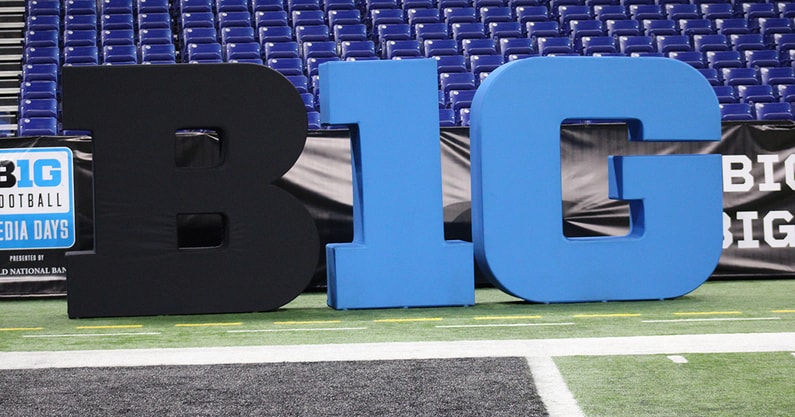ESPN's Pete Thamel explains how Oregon and Washington could make sense for the Big Ten

It’s been more than a year since the Big Ten turned to the Pac-12 to add USC and UCLA next season. Although commissioner Tony Petitti pumped the brakes on expansion talks at Big Ten Media Days last week, circumstances have started to change as conference presidents reportedly held discussions about expansion Wednesday.
Two potential targets include Oregon and Washington. If that sounds familiar, that’s because it’s a similar conversation to last July, according to ESPN’s Pete Thamel.
The Ducks and Huskies could make for intriguing candidates for expansion if the Big Ten chooses to go that direction, Thamel said on College Football Live Wednesday evening. It all depends on what happens with the Pac-12, though, after commissioner George Kliavkoff presented a heavy-streaming media deal on Tuesday.
“In talking to sources this afternoon, those logical expansion options would be Oregon and Washington,” Thamel said. “The Big Ten had been engaged with Oregon and Washington after its expansion of USC and UCLA. That didn’t work out. This time around, however, the Ducks and the Huskies are in a vulnerable position and they could likely come for a discount. I was told today that Oregon and Washington would ultimately represent about 13 football games that would get spread over the league’s current four partners. So it’s not like a whole new network would have to come in. Somebody would have to step up within the partners.
“But there’s a logical landing spot, and it’s a matter of what price Oregon and Washington would come in for. I think it’s a lot more attractive to the Big Ten now to get them at a discount.”
News of the Big Ten’s discussions came exactly one week after Petitti’s comments in Indianapolis — just hours before Colorado announced its plans to leave the Pac-12 for the Big 12.
“What I’ll say is all the direction I’m getting from leadership, our presidents and chancellors, athletic directors, is to focus on UCLA and USC,” Petitti said. “I’m proud of the scheduling format we created in football. I think it touches on all the right things.”
As for what changed, Thamel said the deal Kliavkoff presented created an uncertainty around the Pac-12 and is a big reason it’s in its current position.
Top 10
- 1Breaking
Nico Iamaleava
Tennessee & QB under contract negotiations
- 2New
Arch Manning
Texas QB explains staying
- 3
Mark Pope
Receives raise, extension
- 4Hot
QB Mock Draft
Predicting landing spots for Top 12
- 5
Pat McAfee
Host talks Mary Kate Cornett lawsuit
Get the On3 Top 10 to your inbox every morning
By clicking "Subscribe to Newsletter", I agree to On3's Privacy Notice, Terms, and use of my personal information described therein.
“It’s an interesting climate because part of the Big Ten’s hesitancy on Oregon and Washington last time around — they also looked at Cal and Stanford — was they didn’t want to be the ones to kill the Pac-12,” Thamel said. “There’s obviously a weird undercurrent of collegiality in college sports despite the fact that it’s a cold-blooded, billion-dollar business. This time around, I got a lot of that sense [on] Sunday-Monday. Well, Arizona doesn’t want to be the one that leaves because they don’t want to kill the league. They don’t want Arizona State and Utah to come with them, etc.
“But as this week has unfolded and as uncertainty has come with the Pac-12 presenting that Apple deal, I’m getting less and less of a sense that that’s the tenor of the landscape. The order that things could unfold is uncertain, but the Pac-12 is in a very fragile position right now and the fact that the Big Ten is formally snooping around really underscores the fragility of the entire landscape. College sports could look very different by the time foot hits ball in September.”
The Big Ten is gearing up to start a lucrative, multi-billion dollar media rights deal this season with three networks — FOX, CBS and NBC. Of course, the Big Ten Network is still a key figure, but the three major networks will put games on national TV. If any more teams come in, they likely won’t receive full revenue shares like USC and UCLA will, according to ESPN’s Adam Rittenberg.
The Big Ten confirmed it’s trying to see the whole board with expansion while reaffirming its desire to integrate USC and UCLA into the league in light of the report.
“The Big Ten Conference is still focused on integration of USC and UCLA but it’s also commissioner’s job to keep conference chancellors and presidents informed about new developments as they occur,” the statement read.